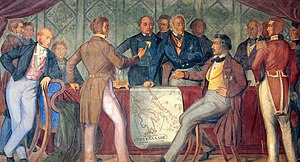
Back بروتوكول لندن (1830) Arabic Лонданскі пратакол (1830) Byelorussian Лёнданскі пратакол (1830) BE-X-OLD Лондонски протокол (1830) Bulgarian Londoner Protokolle zu Griechenland German Πρωτόκολλο του Λονδίνου (1830) Greek Protocolo de Londres (1830) Spanish Protocole de Londres (1830) French Լոնդոնյան արձանագրություն Armenian Protocollo di Londra (1830) Italian
 | |
| Context | The first official international diplomatic act that recognized Greece as a sovereign and independent state. |
|---|---|
| Signed | 3 February 1830 |
| Location | London, United Kingdom |
| Parties | |
The London Protocol of 1830, also known as the Protocol of Independence (Greek: Πρωτόκολλο της Ανεξαρτησίας) in Greek historiography, was a treaty signed between France, Russia, and Great Britain on 3 February 1830. It was the first official international diplomatic act that recognized Greece as a fully sovereign and independent state, separate from the Ottoman Empire. The protocol afforded Greece the political, administrative, and commercial rights of an independent state, and defined the northern border of Greece from the mouth of the Achelous or Aspropotamos river to the mouth of the Spercheios river (Aspropotamos–Spercheios line). As a result of the Greek War of Independence, which had broken out in 1821, the autonomy of Greece in one form or another had been recognized already since 1826, and a provisional Greek government under Governor Ioannis Kapodistrias existed, but the conditions of the Greek autonomy, its political status, and the borders of the new Greek state, were being debated between the Great Powers, the Greeks, and the Ottoman government.
The London Protocol determined that the Greek state would be a monarchy, ruled by the "Ruler Sovereign of Greece". The signatories to the protocol initially selected Prince Leopold of Saxe-Coburg and Gotha as monarch. After Leopold declined the offer of the Greek throne,[1] a meeting of the powers at the London conference of 1832 named the 17-year-old Prince Otto of Bavaria as the King of Greece and designated the new state the Kingdom of Greece.
- ^ Ιστορία του Ελληνικού Έθνους, p. 575.